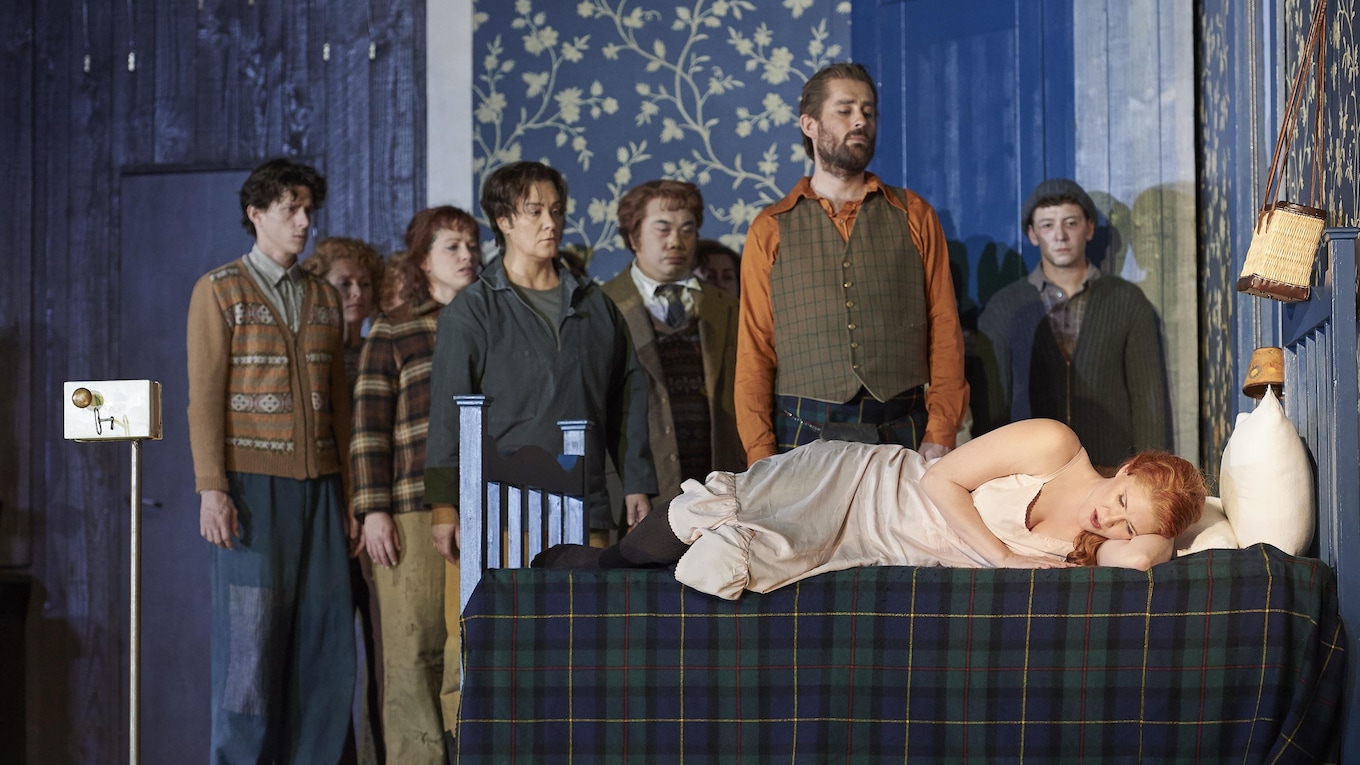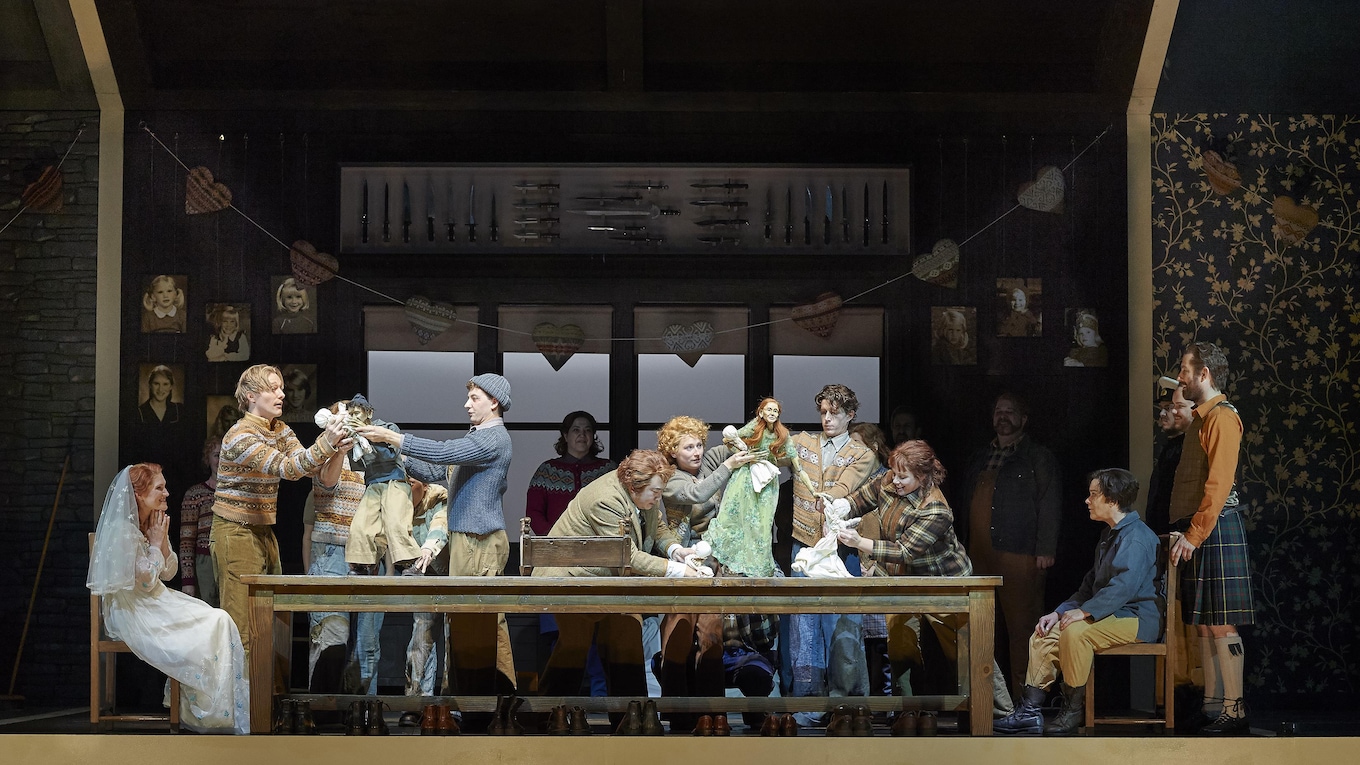In Act 2 of Johann Strauss’s Die Fledermaus, Adele and the rest of the ensemble sing “All I want is more champagne,” one of the operetta’s snappier numbers. It’s basically a big party scene.
“We do know how to party,” muses soprano Jane Archibald, who has sung Adele at the Metropolitan Opera, “and if the moment is right, we do it up good.”
But during our recent phone conversation, Archibald explained how the reality of being an opera singer is actually far removed from the champagne-swilling ball we often assume it to be.
“It’s a life of great sacrifice a lot of the time. And sometimes when you’re in the sacrifice and trudging-through parts, you’re like, ‘Wow, it seems unbalanced; mostly sacrifice, except for these little moments,’” she explains.
“But then, you have one of these little moments of beauty, sometimes just a fleeting second onstage, when everything just gels and takes on so much more importance, and it does balance out the need to be careful, the need to get good sleeps, the need to watch your energy, the need not to drink champagne because you have a stage orchestra the next day.”
Jane Archibald sings starting at 1:16 in a video clip from the dress rehearsal for a 2013 Metropolitan Opera production of Strauss's Die Fledermaus.
Archibald is in Toronto this month to sing Ginevra, a role debut for her, in the Canadian Opera Company’s production of Handel’s Ariodante, opening Oct. 16 at the Four Seasons Centre for the Performing Arts.
She has become a favourite with COC audiences, due in large part to a good relationship with COC artistic director Alexander Neef. “He’s always interested to hear from me,” she says, “if I’m looking to add repertoire, or move in a new direction, which has been great.” After triumphing in the title role of the COC’s production of Handel’s Semele in 2012, which she reprised on the company’s 2015 tour to the Brooklyn Academy of Music, she has made it clear she’s always interested in singing Handel.
"There’s something so special about this music and I just adore singing it," she enthuses. "His music is so hummable, it’s so exciting, you know? There’s such a broad range of emotion, there’s a great deal of freedom in staging it [and] a great deal of freedom for singers to express themselves in their own unique way. The raw material gives you so many options — dramatically, musically, in every way."
Ginevra in Ariodante is an especially rich character to portray. The daughter of the king of Scotland, she's engaged to be married to Prince Ariodante. When she rejects the advances of Duke Polinesso, he takes revenge by convincing Ariodante and Ginevra's father that she has been unfaithful. It's an act of misogynistic public shaming that Archibald finds disturbingly familiar. "I’d like to say it’s a story from a different time, but sadly it’s a theme that keeps getting resurrected. I think it’ll speak to anyone who’s at all tuned in to the current climate," she reflects.
"As a singing actor onstage, it’s extremely powerful to take part in it," she continues. "And the way that it’s been brought to life in this production, I’d challenge anyone not to be very moved by it." The COC's production, directed by Richard Jones, uses puppetry at the end of all three acts to heighten the drama. "We’re invited to imagine that it’s one of the rituals or ceremonial aspects of the cultural life of this community. The first time, it’s a celebration of the impending marriage of Ginevra and Ariodante. And then Act 2 happens and things have gone awry, and the way they use the puppets to publicly shame Ginevra, and the way these puppets have been constructed, and the mastery of the puppeteers bringing it to life — it’s really quite powerful. It’s almost difficult for me to do that scene. I haven’t personally experienced [public shaming] in my life, but I find it very upsetting to witness."

Jane Archibald sings Ginevra (on bed) with Alice Coote as Ariodante and Johannes Weisser as the King of Scotland (in front row) in the Canadian Opera Company’s production of Ariodante, 2016. (Michael Cooper)
Back in September, between rehearsals for Ariodante at the COC, Archibald was commuting back and forth to Seattle where she was recording Messiaen’s Poèmes pour Mi with the Seattle Symphony under Ludovic Morlot. These songs by Messiaen are not typical coloratura soprano repertoire, and Archibald says she enjoys trying music that's a bit outside her fach. "I’m very happy being a coloratura soprano, and I’m not trying to fix anything that’s not broken, but there’s room and colour and stretch happening in the voice that I’m really interested in exploring."
Fortunately for Archibald, she doesn't struggle, as some singers do, with singing different styles of music concurrently. "I don’t consciously say, 'Now I’m going to sing with my Handel technique,' or, 'Now I’m going to sing with my bel canto technique.' The music kind of naturally brings out the right voice for me," she confides. However, she does recall one occasion when she had to shift vocal gears on a dime.
"About five years ago, I was singing Zerbinetta [in Richard Strauss's Ariadne auf Naxos] in Munich while covering performances of Cleopatra [in Handel's Giulio Cesare] in Paris, and I had to sing a Zerbinetta on the Saturday night, and get up on the Sunday morning, fly to Paris, and sing the second half of the show on Sunday afternoon, and that was tricky because then you have to consciously think, 'OK, I’m back to Handel now. I’ve got to remember to keep the lightness in the voice.' But it doesn’t take long. You just have to put yourself in that head space.”
'Uh oh, something feels weird'
This isn't to say Archibald isn't susceptible to the same perils all singers face day in and day out. "Singers pay attention to the tiniest tickle in their throats that most people wouldn’t even notice," she tells us. "We notice it two or three days before — 'Uh oh, something feels weird' — and we immediately start to be cautious just in case there’s anything brewing." It's the most stressful aspect of an opera singer's life.
"Of course, you want to sound your best, but [if you're sick], you literally can’t do your job and if you can’t do your job, you can’t get paid. In addition to being our passion, [singing] is also our livelihood, and we have very little [job] security. In almost all cases, we’re paid per performance, so if you do six weeks of rehearsal, and pay for your apartment and everything else — and in my case, I’m in the stage of life where I’m bringing a nanny and my daughter with me, so I’m paying for a three-bedroom apartment instead of a studio — and then you get to the shows and you get sick and you can’t do the first three, well, you’re just out that money. Some people actually take a loss if sickness strikes at the wrong moment. It’s a big financial risk and it’s also just incredibly stressful."
It seems harsh, and is an aspect of the classical music business most people aren't aware of, as Archibald illustrates: "To be in that place where you’re like, 'I think I can sing; I’m not sure. I’m definitely under the weather. Am I going to get through it?' Nobody wants you to cancel, and yet nobody wants you to not cancel and then not be able to get through to the end. And judgment is swift and harsh and very public. It’s a roll of the dice every time."
And yet, despite the stress, she can't picture herself doing anything else.
"The wonderful moments are really wonderful, and for many of us, our identities are hugely wrapped up in being singers," she says, underlining the common traits of everyone who has successfully fought their way to a level of esteem in the profession. "We’re driven, we’re ambitious. We have ego and pride about what we have accomplished, about what we want to accomplish, about what we feel our own talent might be. So it would be a massive personality crisis if one were to leave it. What’s your identity if you’re not this opera singer attempting to do something on this very elite level?
"I’ve never thought of anything else I could do that would give me the same level of personal satisfaction. I can think of lots of things that would be easier, in which there would be fewer sacrifices. I’d be home every night to read my daughter a story, sleep in the same bed every night — all those things would be really wonderful. But I’m not sure I’m ready for that."
Jane Archibald sings Ginevra in seven performances of the COC's production of Handel's Ariodante, starting Sunday, Oct. 16, at 2 p.m. at the Four Seasons Centre for the Performing Arts in Toronto.

Jane Archibald, left, performs in the Canadian Opera Company's production of Ariodante, 2016. (Michael Cooper)
Explore more:
Best opera ever? Barbara Hannigan chooses Messiaen's Saint François d'Assise

